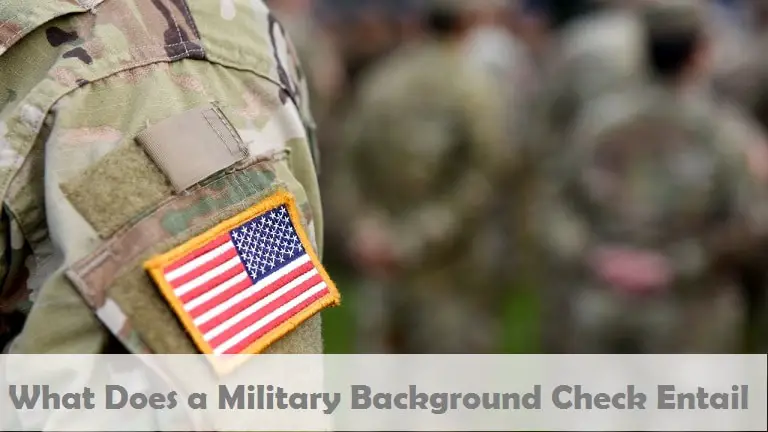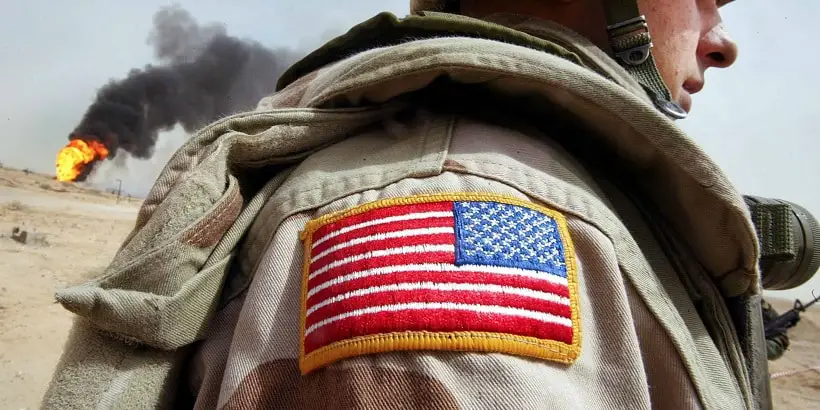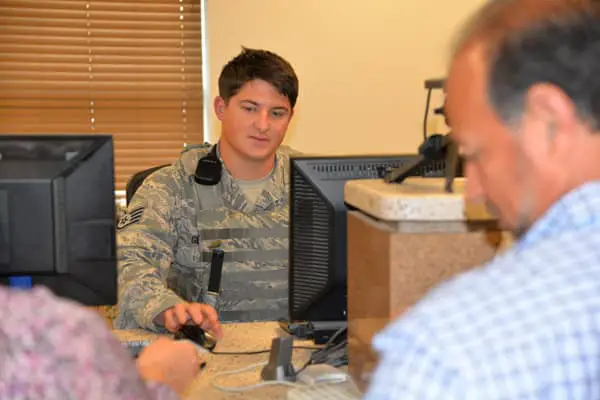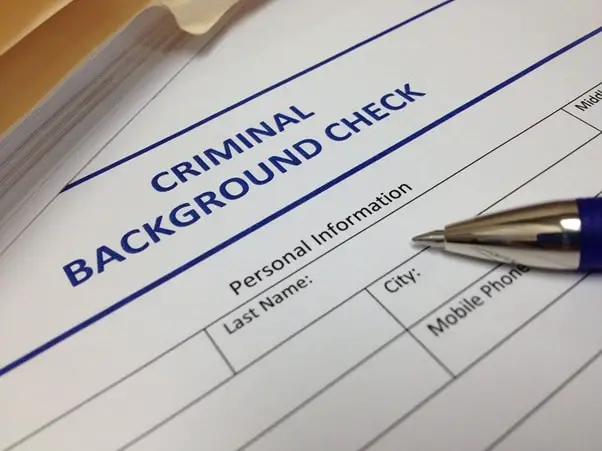Background checks, in general, are to make sure that successful applicants to jobs will be suited for the demands and stresses of the job that they are applying to, including considerations about how they hold themselves in their day-to-day life and the decisions they have made in the past. In particular, a military background check is one of the most thorough and rigorous for good reason –
– as an individual who is tasked with protecting the wider public and possibly responsible for who has access to firearms or even heavier arms, the military needs to make sure that find employment with them are reliable and trustworthy enough that any security clearance that would be granted to an individual is done so safely.
Who needs a military background check?

Anyone who is gaining employment in a government job may lead to a need for security clearance. This involves entry-level jobs that would not obviously require one – even if you are working in a position for the government that may not need a security clearance, you will still have to undertake a military background check regardless.
If you are planning on working in the private sector, this may not be the case, but you will need one if requires access to “classified information pertinent to national security”; this is obvious of the utmost importance, so an individual will be expected to show that they are trustworthy and loyal enough to gain access to them, private or otherwise.
It should be noted that a full background check investigation can take an indefinite amount of time and, as such, should not be considered an easy job to find quickly.
Also, as there is no one type of military background check, the exact nature of what you will have to undergo will largely depend on the position that you are applying for – a position that needs to fill by someone who is entrusted with Top Secret information that is of great importance or is of great sensitivity to the U. S. will have a much more thorough check than someone who is applying for an entry-level job.
Due to the size of U. S. military, the actual workload and physical ability to address the investigative requirements to check every single person applying to positions within the army, navy, air force, or coast guard may be too great for the actual workforce and, as such, may be greatly delayed due to these restrictions.
Regardless of what position is being applied for, there are some general requirements and checks which must be made before an offer of employment will be made.
What is a security clearance?

A security clearance is a status granted to individuals that allows them to access classified information and restricted areas. These are granted to those who are in need of information or access to an area and have a legitimate reason to need or access that resource.
They will generally require an extensive background check and for the individual applying to gain security clearance to sign a non-disclosure agreement; the nature of the clearance, however, can differ.
The Secret security clearance is necessary for a wide range of employment opportunities in a military setting takes between 3 months and a full year to investigate, and must be re-investigated every 10 years.
On the other hand, a Top Secret security clearance generally takes between 6 and 18 months to obtain due to the in-depth and far-reaching nature of the background search and they must be reinvestigated every 5 years.
Depending on the level of security clearance needed, you should look into the different lengths of research time, the renewal time period, and common grounds for disqualification.
The most common reason for someone to be turned down for a Secret clearance, for example, is the poor financial history and inability to give good justification for foreign or criminal activities.
Read Also: What Military Branchs Accept Felons.
What is in a military background check?

As should be clear by now, military background checks are in-depth and take a long time to be carried out – this is due to the high level of confidence that must be placed in a person before they are allowed to access secrets that are important to national security.
The nature of the check is not restricted to the security clearance check, however. There are many checks that could be employed in the recruitment process, but generally, in addition to the security clearance check, there is also a questionnaire, a fingerprinting and screening check, a criminal history investigation, and an employment history check which every individual planning to work in the military must pass before they are able to begin gainful employment.
Although many assume that these would be carried out by the FBI, generally these checks are handled by the U. S. Office of Personnel Management, the Department of Defense, or a number of other smaller agencies (unless you are applying for a high-level role such as as a Presidential appointee, in which case the FBI will likely conduct the background assessment).
All of these factors are employed by those recruiting in order to find individuals of good moral character and are reliable, trustworthy, have good conduct, and have unswerving loyalty to the United States.
The questionnaire
Just like a job application form, a questionnaire must be filled in by an applicant that is searching for employment in the military. The questions can pertain to any subject that the employer considers important in the vetting process, such as criminal history or past drug use.
Unlike a non-military job application, however, it is not illegal to not declare any historical wrongdoing – it will end the job consideration process, though, so be aware that even though you may not need to admit your history as (for example) a felon to your prospective employer, failing to answer the question will result in disqualification from the employment process.
Being honest at this stage is key; lying is an offense and you may face additional charges further down the line if you are not truthful. Refusing to fill in the form to the best of your knowledge will result in your chance of finding a job in the military disappearing possibly permanently.
It is also highly likely that an individual who has filled in the questionnaire will have an interview based on the same topics that have been answered by the applicant. This is a fine opportunity to explain the conditions that lead to any crime that was committed.
Recommended: Can you Join the Military with a Criminal Record?
Fingerprinting and criminal background check

All federal employees must be fingerprinted and screened using the FBI criminal database, including the military. These are carried out to find out the nature of any crimes committed and the nature of the conviction that the applicant faced; it is possible that a long history of crime (and not necessarily only felony crimes) or drug abuse will lead to an individual being refused access to employment at this stage.
However, with the ever-growing need for army recruits in the U. S., it is possible that if an individual can pass the associated physical and mental tests that are run they can obtain a satisfactory number of character references from the wider community that show their growth as a human being after having left prison.
The award of a felony waiver is somewhat rare and will not be granted for those who have carried out the most serious crimes, so it is unlikely that you will find employment if you have committed violent felonies or offenses similar to it.
Even if the initial background check is successful, there is also the possibility of additional checks which could involve further criminal history investigation checks or a drug test. As previously explored, the security clearance check can then take place and will involve a series of interviews with those close to you, including spouses, friends, family members, former employers, teachers, and any other professional reference.
These are very in-depth checks for the purpose of checking that an individual is a trustworthy individual who will not abuse their position within the military to compromise potentially sensitive and serious information, something that could realistically cost lives.
After the background checks

When all the appropriate checks have been made, a report will be put together by those who have carried out the investigations and passed onto adjudications officials who required the checks to be carried out in the first place. This will then be passed onto the relevant personnel or security office.
You can request a copy of the report due to the Privacy Act to see how your history has been assessed and who has assessed it by contacting those who have run the OPM investigation and including your full name, Social Security number, date, and place of birth, and signing the request.
This will give you a good idea of how you are seen from a highly thorough and scrupulous checking process and what you can change if you were to apply for a position again (if you are eligible).
If you have a background which you would like to make amendments to (such as believing that you have served the debt to society you have accrued due to past crimes), seek legal advice and see what you can do in order to change what others see when you go through a vetting process and increase your chances of having a successful background check.

I WANT TO KNOW IF I SERVE IN THE MILITARY FOR FOUR YEARS AND I HAD GOTTEN OUT AND I KILL SOMEONE BY ACCEDENT AND SEVER FIFTEEN YEARS IN PRISON CAN I STILL GET SOME BENEFIT PLEASE LET ME KNOW